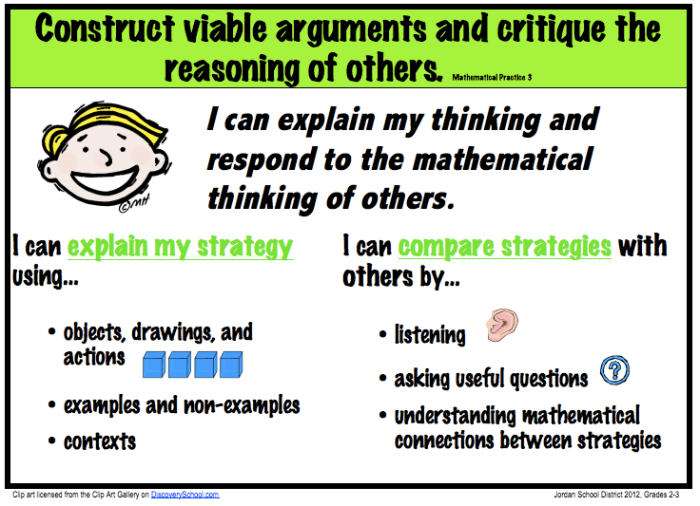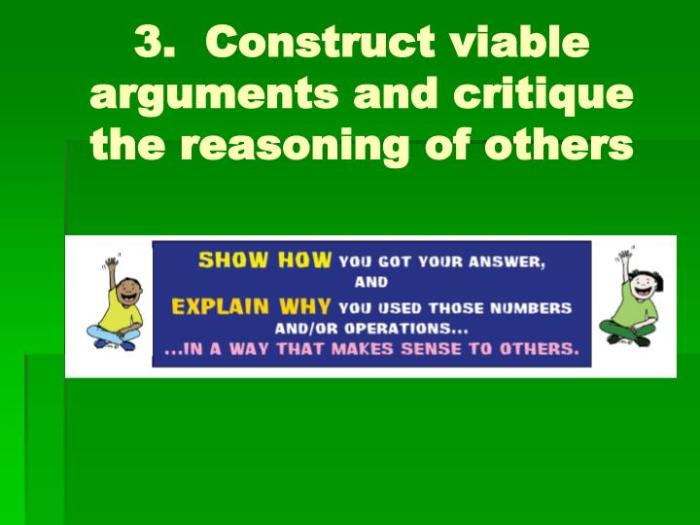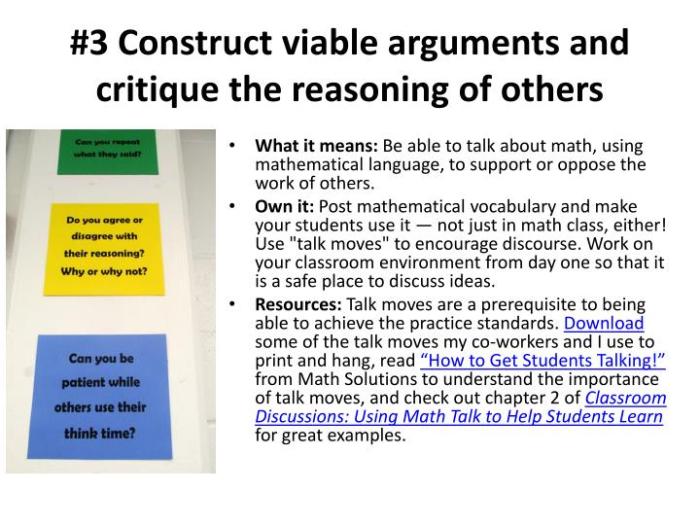Construct viable arguments and critique the reasoning of others – Constructing viable arguments and critiquing the reasoning of others are essential skills for effective communication and critical thinking. This guide provides a comprehensive overview of these skills, empowering individuals to engage in meaningful discussions and make informed decisions.
By understanding the principles of argumentation and critique, readers will develop the ability to identify assumptions, evaluate evidence, construct sound arguments, and respectfully challenge opposing viewpoints.
Constructing Viable Arguments: Construct Viable Arguments And Critique The Reasoning Of Others

Crafting cogent arguments is essential for effective communication and critical thinking. This process involves identifying assumptions and biases, evaluating evidence, constructing logical arguments, and critiquing the reasoning of others.
Identifying Assumptions and Biases
Assumptions are beliefs or premises that are taken for granted without proof. Biases are preconceived notions or inclinations that influence our thinking. Identifying these hidden factors is crucial for evaluating the validity of arguments.
- Common assumptions include universality, normalcy, and authority.
- Common biases include confirmation bias, self-serving bias, and in-group bias.
- Techniques for uncovering hidden assumptions and biases include examining the language used, considering alternative perspectives, and seeking feedback from others.
Evaluating Evidence
Evidence supports or refutes claims made in an argument. Its credibility and relevance must be carefully assessed.
- Criteria for evaluating evidence include accuracy, reliability, validity, and sufficiency.
- Different types of evidence include empirical data, expert testimony, and anecdotal evidence, each with its own strengths and weaknesses.
- Assessing the reliability and validity of evidence involves examining the source, methodology, and potential biases.
Constructing Logical Arguments
Logical arguments are structured to ensure their validity. Deductive reasoning draws a conclusion from a set of premises, while inductive reasoning generalizes from specific observations.
- A sound argument consists of premises that logically support the conclusion.
- Avoiding logical fallacies, such as ad hominem attacks and straw man arguments, is essential for constructing valid arguments.
- Strengthening arguments involves providing sufficient evidence, using clear language, and addressing potential objections.
Critiquing Arguments
Critiquing arguments involves identifying weaknesses in reasoning and presenting counterarguments.
- Common strategies include examining the evidence, challenging the assumptions, and identifying logical fallacies.
- Respectful disagreement involves acknowledging opposing viewpoints and addressing their strengths while presenting a well-reasoned critique.
- Techniques for challenging opposing viewpoints include providing counter-evidence, refuting their assumptions, and pointing out logical inconsistencies.
Engaging in Constructive Dialogue
Constructive dialogue promotes open-mindedness and critical thinking.
- Effective communication involves listening actively, asking clarifying questions, and avoiding personal attacks.
- Defending arguments requires presenting evidence, addressing objections, and being willing to revise one’s position based on new information.
- Finding common ground and reaching consensus involves identifying areas of agreement and seeking solutions that accommodate multiple perspectives.
Case Study Analysis, Construct viable arguments and critique the reasoning of others
Analyzing real-world arguments allows for a practical application of these principles.
By identifying assumptions, evaluating evidence, critiquing reasoning, and engaging in constructive dialogue, we can strengthen our ability to construct viable arguments and critically assess the arguments of others.
FAQ Resource
What is the importance of identifying assumptions in arguments?
Identifying assumptions allows us to uncover hidden premises that may influence the argument’s validity and credibility.
How can I strengthen the logical structure of my arguments?
By adhering to the principles of deductive and inductive reasoning, you can ensure that your arguments are well-structured and logically sound.
What are some common strategies for critiquing arguments?
Common strategies include identifying logical fallacies, evaluating the credibility of evidence, and respectfully challenging assumptions.


